Showing Spotlights 1 - 8 of 41 in category All (newest first):
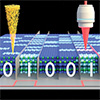 Novel data storage approach using atomic-scale defects in silicon carbide could enable high-density data archiving for over a million years, far surpassing current methods.
Novel data storage approach using atomic-scale defects in silicon carbide could enable high-density data archiving for over a million years, far surpassing current methods.
Apr 3rd, 2024
 A trailblazing metasurface computer architecture solves intricate matrix equations orders of magnitude faster than conventional processors by performing complex math intrinsically using scattered light waves.
A trailblazing metasurface computer architecture solves intricate matrix equations orders of magnitude faster than conventional processors by performing complex math intrinsically using scattered light waves.
Jan 12th, 2024
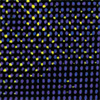 Researchers developed resistive random access memory using high-entropy oxides, advancing memory devices with improved performance, efficiency and reliability.
Researchers developed resistive random access memory using high-entropy oxides, advancing memory devices with improved performance, efficiency and reliability.
Oct 18th, 2023
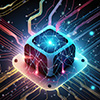 Researchers have created an artificial synapse device that displays plasticity and learning ability by merging a photoelectric perovskite material with an organic ferroelectric polymer. The advance offers a pathway to intelligent electronics and insights into the brain.
Researchers have created an artificial synapse device that displays plasticity and learning ability by merging a photoelectric perovskite material with an organic ferroelectric polymer. The advance offers a pathway to intelligent electronics and insights into the brain.
Oct 11th, 2023
 Discover how researchers use self-rolling ferroic oxide films to revolutionize data storage. This innovative method increases storage density by up to 45 times, potentially achieving ultrahigh-density information storage of 10 Tbit per square inch, paving the way for next-gen memory technology.
Discover how researchers use self-rolling ferroic oxide films to revolutionize data storage. This innovative method increases storage density by up to 45 times, potentially achieving ultrahigh-density information storage of 10 Tbit per square inch, paving the way for next-gen memory technology.
May 15th, 2023
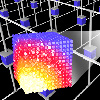 Phase change memory is an emerging technology with great potential for advancing analog in-memory computing, particularly in deep neural networks and neuromorphic computing.
Phase change memory is an emerging technology with great potential for advancing analog in-memory computing, particularly in deep neural networks and neuromorphic computing.
Apr 14th, 2023
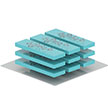 Organic semiconductors (OSCs) are a class of semiconductor materials consisting of conjugated molecules or polymers. Compared to inorganic semiconductors, OSCs have distinctive advantages including being solution-processable, suitable for low-cost and large-area fabrication of electronics, and applicable to flexible/stretchable electronics, among others. Given the importance of doping techniques for semiconductors, it is highly attractive to establish doping methodologies for OSCs similar to that for silicon. This would simplify the difficulty and cost of synthesizing different types of OSCs for various applications, as well as lead to interesting structures such as organic PN homojunctions.
Organic semiconductors (OSCs) are a class of semiconductor materials consisting of conjugated molecules or polymers. Compared to inorganic semiconductors, OSCs have distinctive advantages including being solution-processable, suitable for low-cost and large-area fabrication of electronics, and applicable to flexible/stretchable electronics, among others. Given the importance of doping techniques for semiconductors, it is highly attractive to establish doping methodologies for OSCs similar to that for silicon. This would simplify the difficulty and cost of synthesizing different types of OSCs for various applications, as well as lead to interesting structures such as organic PN homojunctions.
Jun 9th, 2022
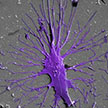 We are in the early stages of neural computing and have time to think through the ethical issues involved. Among other things, if neural computers become common, we will grapple with tissue donation issues. Scientists have found that human neurons were faster at learning than neurons from mice. Might there also be differences in performance depending on whose neurons are used? Might Apple and Google be able to make lightning-fast computers using neurons from our best and brightest today? Would someone be able to secure tissues from deceased genius's like Albert Einstein to make specialized limited-edition neural computers?
We are in the early stages of neural computing and have time to think through the ethical issues involved. Among other things, if neural computers become common, we will grapple with tissue donation issues. Scientists have found that human neurons were faster at learning than neurons from mice. Might there also be differences in performance depending on whose neurons are used? Might Apple and Google be able to make lightning-fast computers using neurons from our best and brightest today? Would someone be able to secure tissues from deceased genius's like Albert Einstein to make specialized limited-edition neural computers?
May 24th, 2022
 Novel data storage approach using atomic-scale defects in silicon carbide could enable high-density data archiving for over a million years, far surpassing current methods.
Novel data storage approach using atomic-scale defects in silicon carbide could enable high-density data archiving for over a million years, far surpassing current methods.
 Subscribe to our Nanotechnology Spotlight feed
Subscribe to our Nanotechnology Spotlight feed





